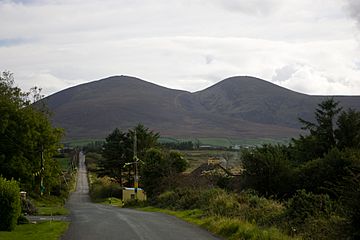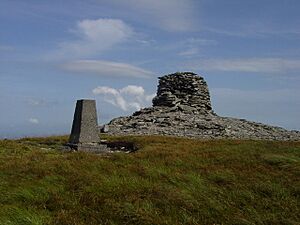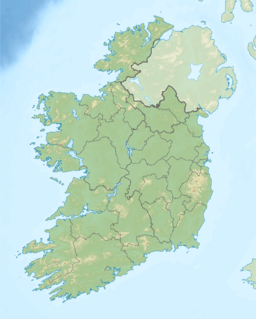Paps of Anu facts for kids
Quick facts for kids Paps of Anu |
|
|---|---|
| Dá Chích Anann | |
 |
|
| Highest point | |
| Elevation | 694 m (2,277 ft) |
| Geography | |
| Climbing | |
| First ascent | Unknown |
| Easiest route | From Rathmore, County Kerry |
The Paps of Anu are two famous mountains near Killarney in County Kerry, Ireland. The eastern mountain, called The Paps East, stands about 694 meters (2,277 feet) tall. The western mountain, The Paps West, is just a little shorter at 690 meters (2,264 feet).
These mountains are named after Anu, who was believed to be an ancient mother goddess. An old Irish text, Cormac's Glossary, describes Anu or Danu as "the mother of the gods of Ireland". People in ancient times might have seen these mountains as a symbol of the Earth being a motherly figure.
The Paps of Anu: Ireland's Ancient Mountains
On top of each mountain is a prehistoric stone pile called a cairn. These cairns might have been small passage graves or places where people were buried in stone boxes called cists. The cairn on the eastern Pap is a bit bigger, about 4 meters (13 feet) high and 16 meters (52 feet) wide.
A line of stones, known as Na Fiacla (which means 'The Teeth'), connects the two mountain tops. People think this was a special path used for ceremonies long ago. An archeologist named Frank Coyne suggested that these mountains were considered very sacred. He believed that the tops of both Paps were used for important rituals in ancient times.
There is also a stream that flows between the two mountains. One part of the stream goes north into a small lake called Lough Nageeha. The other part flows south into the Clydagh River.

The Sacred Site of Cahercrovdarrig
To the northeast of the Paps is an old circular stone area called Cahercrovdarrig. Its name means 'Red Claw Fort' or 'The City'. You can see the Paps clearly from Cahercrovdarrig, which suggests the two places were connected.
This site includes several interesting features. There's a possible ruined ancient tomb, a stone with ancient Irish writing called ogham, an earthen mound, a holy well, and a stone altar with a cross carved into it. When there's a lot of water, the well "noisily bubbles up from its depths."
People believe Cahercrovdarrig is named after the goddess Crobh Dearg. It was likely used for Beltane rituals and celebrations in the past. Beltane is an ancient festival celebrated around May 1st. Over time, the site and its festivals slowly became linked with Christian traditions.
A yearly May Day festival was held there until World War II. A local storyteller, Dan Cronin, said the festival included music, dancing, and champions showing off their skills. People would walk around the well and other parts of the site while saying prayers. They also walked their cattle around the well as a way to purify them.
In 1925, a Mass (a Christian church service) was held at the festival for the first time in modern memory. After World War II, the big celebrations stopped. Only a few people would visit for prayers or a small Mass on May Day. Later, a statue of Mary was placed at the site. In 1983, a local Irish cultural group, working with the local priest, brought back music and dance to the May Day festival at Cahercrovdarrig.
 | Chris Smalls |
 | Fred Hampton |
 | Ralph Abernathy |


